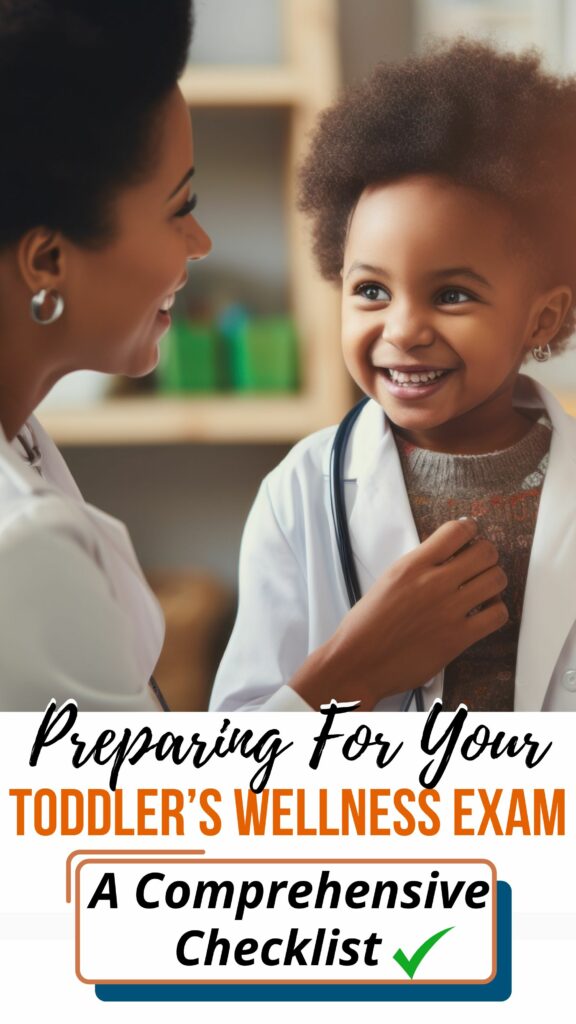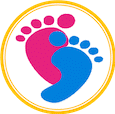
Preparing For Your Toddler’s Physical Examination: A Comprehensive Checklist
One of the inevitable rights of passage for caregivers are the ongoing physical exam appointments for our babies, toddlers, and children. As a parent, it is natural to want the best for our children, and their health and well-being is at the top of the list.
So in this post, I will provide a comprehensive checklist for parents to follow when preparing for their toddler’s physical examination. By following this checklist, you can help make the process smoother and less stressful for both you and your little one.
This checklist covers everything from smart scheduling and distraction packing to preventing anxiety before it starts. Incorporate these tips into your appointment routine, and you’ll be on your way to smiles all around. Then, celebrate your tiny trooper’s triumph with their favorite treat!

Schedule The Appointment
Scheduling your toddler’s physical exam is the first step to take. When booking the appointment:
- Call your pediatrician’s office well in advance and let them know you need to come in for an annual preventive health exam for your toddler. These appointments book up faster than sick visits.
- Ask when they recommend scheduling it based on when your child was due last year. Check if they have an online portal where you can view past dates as a reference.
- Mention any pressing health concerns so they allow ample time to address multiple issues thoughtfully.
- Provide all essential contact and insurance information upfront to expedite appointment confirmation once a slot opens.
- Write down appointment logistics repeated to you, such as location, doctor name, date, and exact time.
- Request reminders be sent through email and text message to ensure you don’t forget this important visit.
- Repeat back appointment specifics to check you have all details captured accurately before hanging up.
Booking early and confirming all vital information sets you up for exam success. You may visit Rexburg Pediatrics or call your local pedia clinic for an appointment.
Keep the confirmation handy so registration check-in moves quickly, too. Arriving relaxed and prepared means your toddler’s health evaluation gets off to the right start!
Gather Key Information
Having the right information and documents at your toddler’s appointment helps the doctor provide the best care. That means collecting:
- Your child’s complete medical history since birth. Scan through baby books or past notes to refresh your memory on milestones reached, injuries, major illnesses, ER visits, or urgent care needs over the past year.
- Updated contact info for parents, guarantors, caregivers, or any alternatives authorized to approve treatment if you can’t be reached.
- Details on new behaviors, sleep patterns, diet changes, or concerns that you want to discuss.
- Any new prescriptions from specialists that the pediatrician should know about to coordinate care.
- Vaccine records to ensure your kiddo gets immunizations needed for their age group at the visit itself. Neglecting booster shots puts them at risk.
Having all this key data handy allows for an efficient, thorough preventive health assessment tailored specifically to your growing toddler’s situation.

Assemble The Toddler’ Go Bag
Toddlers thrive on consistent routines and familiar comforts. Help yours feel secure in uncertain exam rooms by packing their essentials, including:
- A couple of toys like chunky cars, squashy balls, textured books, or ring stacks. Having their own toys prevents sharing germs with waiting room communal bins.
- I also love stickers and coloring books for longer visits
- Healthy snacks/drinks in spill-proof cups or pouches to keep your munchkin fueled. Stock their favorites to motivate good behavior.
- Diapers, travel wipes, and disposal bags should accidents strike far from home—better safe than soaked!
- A complete clothing change, even for potty rockstars. Check-ups involve messy measures.
- Any lovies or blankets serving as emotional lifelines for your little one.
- A tablet loaded with engaging apps, games, eBooks, shows, and movies queued up for entertainment. Use headphones to not disturb others.
- Bandages, antiseptic wipes, and antibiotic cream to treat minor boo-boos from errant toys.
Having this customized toddler go-bag ready to grab accelerates your departure and provides comfort while waiting and during the visit itself. Reduce uncertainty by surrounding your child with familiar items.
The more at ease they feel in the exam room, the faster the appointment finishes. Then, you can celebrate its successful completion with special treats!
Explain The Exam
Toddlers thrive when they know what’s coming. Avoid surprises by explaining check-ups like this:
- Read simple books together about visiting the doctor. Point out tools they’ll see for listening to hearts, looking in ears, etc.
- Show images of exam rooms online, so they’re familiar. Describe where you’ll sit together and what assistants might enter.
- Demonstrate with dolls how the doctor checks eyes, reflexes, and growth. Use a favorite toy for pretend exams, allowing your child to ‘examine’ the doll afterward.
- Explain they can ask questions or snuggle with you if uncertain. Emphasize you’ll stay together the whole appointment.
- Role play to build confidence. Have your little one take your temperature with play medical kits while you model good patience.
Knowing what to expect eases any exam room anxiety. Answer all questions honestly in simple terms. The more familiar your toddler feels with the upcoming events, the smoother the real appointment goes.

Get Adequate Rest
A well-rested toddler equates to a cooperative toddler. In the days and nights leading up to the physical exam:
- Stick to usual nap schedules and bedtimes. Avoid letting excitement or anxiety over the looming appointment disrupt routines that ensure enough total sleep.
- For young toddlers transitioning away from two naps, temporarily reinstate second catnaps if needed so they don’t turn into overtired monsters.
- If you normally allow tablets or toys in bed, consider restricting them for a few nights. Minimize distractions that can detract from sleeping soundly.
- Keep late screen time, including TV watching or tablet play, to a minimum as well so melatonin production isn’t hampered.
- Make the evening before low-key. Skip play-dates or trips out late and indulge in calming activities like stories, cuddles, and warm baths instead.
Skimping on sleep makes exams more taxing for your little ones. Yawns and eye-rubbing are red flags! So, prioritize mellow home nights before the appointment. Gentle mornings set you both up for easier check-in and better focus.
Consider Distractions
Even well-prepared toddlers hit squirmy limits confined to sterile exam rooms. Outsmart boredom and fretfulness by packing engaging distractions:
- Load tablet games, apps, and movies they can play with while waiting. Use headphones to not disturb others.
- Bring interactive books with textures to touch, along with story prompts to hold their interest.
- Tuck in coloring books and washable markers for desk play while you complete forms.
- Let them unwrap new small toys or art supplies once settled in rooms as fun surprises.
- Blow bubbles together or hand puppets to bring silliness to sterile settings.
- Use singing and rhyming games between checks to redirect focus.
- Have favorite healthy snacks for nibbling between stations since everything takes longer with little ones.
- For clingy times, cocoon together in story towels, enacting exams on stuffed animals.
Having a mental list of potential distractions helps encounters go smoothly when toddlers waver. Tap into their natural curiosity and playfulness during tedious portions. Soon, your tiny assistant will eagerly demonstrate how exams help kids stay strong!

Dress For Efficiency
Outsmart inevitable clothing changes during exams with practical picks:
- Opt for a one-piece bodysuit or romper instead of complicated separates requiring total undressing. Inexpensive onesies allow full access without complex snaps.
- Choose stretchy fabrics that slip on/off easily over wiggling toddler limbs rather than restrictive styles requiring bigger contortions.
- Avoid heavy fabrics like denim or knits that hold heat and sweat more during energetic appointments. Light, breathable cotton helps them stay cool and comfy.
- Skip elaborate hairdos, barrettes, bows, or ties that unfasten frequently and disrupt eye/ear examinations needing clear access. Rock the Bedhead Chic look.
- Have your child pick a ‘big kid’ outfit they feel proud wearing. Familiar, beloved clothes aid confidence in unfamiliar appointment settings.
- Bring an extra change folded in your bag should spills or accidents happen en route. Better prevent than rinse later!
Ditching complicated closures for exam day lets you redress squirmy tots faster between stations with less fuss. Comfortable fabrics keep them confident to participate fully while allowing doctors necessary access.
Spending minutes wrestling pants or untangling ties means less time focused on important developmental assessments. Save those ruffly dresses for special events rather than visits where efficiency matters more!
Verify Location Details
Confirm logistics to reduce surprises traveling to unfamiliar offices with antsy toddlers in tow:
- Call ahead the week before and verify the pediatrician’s exact office address and parking options. Confirm whether garages are nearby and the associated fees.
- Map out traffic patterns and route options to pinpoint the fastest way, depending on the time of day. Factor in which entrances are most convenient for toddler drop-offs.
- Research kid-friendly eateries nearby to celebrate successful appointments afterward. Hungry, tired toddlers and lingering appointments don’t mix!
- Phone the day prior to confirm you have the right date, doctor, and arrival time. Validate recommended check-in times since delays risk upsetting little ones.
- Pack cash for parking fees or meters to prevent frantically digging through purses mid-tantrum. Forward-thinking prevents meltdowns!
- Print appointment confirmations to have the office number handy should you run late en route. Notify them immediately of delays exceeding 10-15 minutes.
You already have enough worries calming anxious tots pre-visit without navigating unfamiliar locations! Print directions as a backup for tech glitches, too. Then, use that extra time to enjoy fun rewards together post-exam!

Remain Positive
Toddlers can absorb the stress their parents release during medical visits. Counteract these anxious vibes with upbeat attitudes by:
- Emphasizing check-ups are important for protecting health, not scary events. Describe them as chances to show how much they’ve grown!
- Asking open-ended questions about worries and providing honest reassurance. Toddlers have vivid imaginations, so know their specific concerns.
- Using bright tones that convey confidence in their cooperation and bravery. Matter-of-fact optimism elicits trust.
- Sharing fun memories of staff who previously left great stickers or offered cool toys.
- Avoiding over-preparing if it heightens tension. Nonchalance signals security better than framed photos of the pediatrician!
- Distracting with upbeat games like ‘I Spy’ in waiting rooms rather than dwelling on impending procedures.
- Rewarding their perseverance afterward with celebratory treats and upbeat praise about how they helped the doctor.
Mindset matters when tackling toddler anxiety. Squash your own hesitations first and address specific worries simply without dwelling on unlikely frightening scenarios.
Then, spotlight even small acts of courage immediately after with effusive acclaim and little rewards. Their pride and trust grow with each successful well-check.
Have Realistic Expectations
Accepting toddlers’ limited capacity for long appointments prevents unnecessary frustrations:
- Remember, young children have shorter attention spans, so wiggle room and silly moments, even in prepared kids, are typical. View them as needed sensory breaks.
- Assume visits may extend beyond scheduled times when working with squirmy, chatty tots full of opinions. Allow ample flexibility afterward rather than planning tight schedules.
- Set the bar for model behavior at brief cooperation with individual elements rather than expecting statue-like stillness throughout lengthy exams full of unfamiliar experiences.
- Normalize needing to take brief hall walks when they hit the wall in confined spaces rather than insisting they power through discomfort or enforcing harsh consequences later for acting their age.
- Check your own reflex to tense up or over-criticize developmentally appropriate displays of independence. Instead, redirect gently, allowing some harmless defiance.
- Let small setbacks roll off your back, knowing even well-prepared toddlers have limits on maintaining composure. Stay focused on each segment’s completion.
Holding toddlers to reasonable standards preserves everyone’s sanity while instilling med-visit resilience.
Focus on progress in the right direction through patience and quick praise over demanding rigid perfection. Thriving comes from secure attachments, not from flawless behavior.
Final Thoughts
Annual physical exams provide valuable insight into your growing toddler’s health, even when visits prove challenging. Staying proactive with a checklist means you’ll both make the most of this important appointment.
Maintaining up-to-date records gives the pediatrician the best ability to meet needs. With thoughtful planning, creative distractions, and positive reinforcement, your little one will handle exams swimmingly.
Welcome to my blog! I am an activity mom of three and I have over 15 years of experience crafting, writing, designing and creating. My mission is to bring fun, balance and learning to your busy homes with activities, tips, inspiration, and organization!






